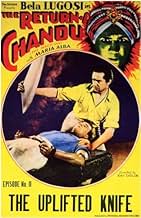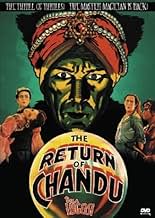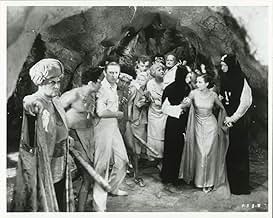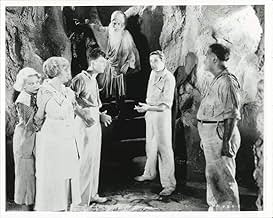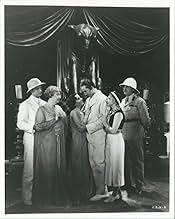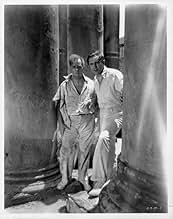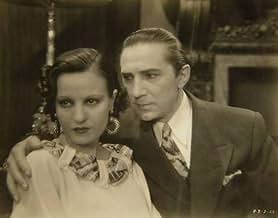Füge eine Handlung in deiner Sprache hinzuThe cult of Ubasti, headquartered on the isle of Lemuria, believes that Princess Nadji of Egypt is a reincarnation of their long-dead goddess, Ossana, and intend to sacrifice her so that Oss... Alles lesenThe cult of Ubasti, headquartered on the isle of Lemuria, believes that Princess Nadji of Egypt is a reincarnation of their long-dead goddess, Ossana, and intend to sacrifice her so that Ossana may be resurrected.The cult of Ubasti, headquartered on the isle of Lemuria, believes that Princess Nadji of Egypt is a reincarnation of their long-dead goddess, Ossana, and intend to sacrifice her so that Ossana may be resurrected.
- Bob Regent
- (as Deane Benton)
- The Voice of Ubasti
- (as Murdock McQuarrie)
- Vitras
- (as Jack Clark)
- Nito
- (Nicht genannt)
- The Dancer
- (Nicht genannt)
- Judy Allen
- (Nicht genannt)
- Party Guest
- (Nicht genannt)
- Party Guest
- (Nicht genannt)
- Morta
- (Nicht genannt)
- Reporter
- (Nicht genannt)
Empfohlene Bewertungen
** 1/2 (out of 4)
Chandu (Bela Lugosi) has to fight off black magic in order to save a Princess who has been chosen for a sacrifies. This is the second feature version of the 15-chapter serial, which also goes by this title. The first feature version, Chandu on Magic Island has a lot more action but this version here is the overall better movie because istead of going for the "cliffhanger" sequences, this one here goes for a more character driven tale. This creates some slowness but it's nice seeing Lugosi play the good guy even though he really doesn't pull it off too well.
Chandu on the Magic Island (1935)
** (out of 4)
Second feature film made from the serial The Return of Chandu. A woman is kidnapped by a jungle tribe in order to be sacrificed so it's up to Chandu (Bela Lugosi) to rescue her. The most interesting thing is seeing Lugosi play the good guy/hero but he doesn't do too much with the role. He's pretty flat throughout the film and some of his dialogue is quite laughable. The ending is quite nice and action packed and the thing is edited down quite nicely but it doesn't work most of the time.
Chandu was a 1930s radio and movie character who served as the inspiration for Marvel's Dr. Strange and also has echoes of the Shadow of pulp fame. His stories tell the adventures of Frank Chandler (Chandu), a man who went to the Far East to study the mystic arts under an ancient and good sorcerer called the Yogi, and came back with the ability to hypnotize, briefly turn invisible, and more. This serial was the second entry in the series, and it followed Chandu as he tried to defend Nadji, the princess of Egypt and his sweetheart, from a sect of dark magicians who wanted to sacrifice her to revive an ancient sorcerer-queen. Chandu's sister, niece, and nephew tagged along throughout and alternately helped or got themselves in deep trouble.
First, the good: it was a rare and pleasant surprise to watch Bela Lugosi in the role of the hero instead of an antihero or villain. This particular type of hero (vaguely Eastern, brain-over-brawn) seemed tailor-made for the Hungarian actor, and he generally did a pretty good job with it. The other actors, including the lovely Maria Alba (Nadji, whose cute accent reminds me of a 1930s Sofia Vergara) and those playing Chandu's family, also put in great performances. The whole story is also completely saturated in a certain retro pulp exoticism that I have to admit I really, REALLY love, and it does most of it in a way that's at least somewhat respectful the non-American cultures it pulls from, if in no way actually interested in depicting them accurately. They also showcased some very impressive, expensive-looking sets at times, especially several they borrowed secondhand from the original "King Kong" movie made just one year before.
Unfortunately, the bad makes up a much longer list, especially in the latter half of the serial. The second 2/3 of the serial gets extremely redundant, with the "last-episode recaps" sometimes lasting 5 minutes. Much of the dialogue is creaky and awful, with all of the villains aping King James English with "thees" and "thous" in botched attempts to uplift dull, bad writing. There's an obnoxious "jungle drum" that plays over the music and the dialogue any time the villains are featured, making much of it barely audible. There are also some extremely cringe-worthy "native savages" who serve as bad guys for parts of the serial, highlighting the dark side of that pulp exoticism I mentioned earlier.
The plot is full of little holes and deus ex machinas, and the direction is so bad that it actually makes Ed Wood's much later work with Lugosi look good by comparison. The director (Ray Taylor) has the lead male hero swooning under torture in a style that went out with the silent movie, and manages to give us multiple camera angles that look right up Bela's rather angular nose. (Talk about catching an actor's bad side!) Finally, though a lesser sin than the rest, I thought it was a waste that we didn't see more of Chandu's supernatural powers at work. For much of the serial, he's just a regular guy, and not even an especially capable one.
All told, I don't regret watching it once (with Bela Lugosi as the hero being the main draw), but the 12-part serial version of this story honestly wasn't worth the time investment. If the good parts intrigued you enough to want to watch it, there was a movie based on the first 4 chapters of the serial that I kind of wish I had stuck with myself in retrospect. That was easily the most interesting section of the serial with the tightest story, the best dialogue and direction, and the most interesting use of supernatural abilities. You do miss out on the cool "King Kong" sets, but it's well-worth it to avoid the meandering, frustrating, and often draggy latter half of the serial (and the cringey cannibal islanders, to boot).
Bottom line: "The Return of Chandu" is an okay story with an interesting role for its iconic lead actor, but stick with the movie on this one, not the full serial.
Wusstest du schon
- WissenswertesThis serial was also released as two features: The Return of Chandu (1934) (using Chs. 1-4) and Chandu on the Magic Island (1935), using Chs. 5-12).
- PatzerIn Chapter 3, when Chandu does a magic spell on the sleeping princess, he places his hand on her head. The camera cuts to her close up: his hand isn't on her head. The next frame shows the long shot: he still has his hand upon her head.
- Zitate
Chandu's Teacher (voice over): Danger is unknown to the true believer. Have faith my son!
- VerbindungenEdited into Chandu on the Magic Island (1935)
Top-Auswahl
- How long is The Return of Chandu?Powered by Alexa
Details
- Laufzeit3 Stunden 28 Minuten
- Farbe
- Seitenverhältnis
- 1.37 : 1
Zu dieser Seite beitragen


